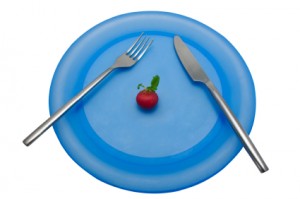How To Lower Your IQ

I need a glass of lemonade.
I sometimes think of the brain as a muscle rather than a computer. A muscle gets tired; so does the brain. A computer doesn’t. A computer can perform multiple tasks simultaneously. A muscle can’t; nor can the brain.
When a muscle gets tired, its performance degrades. After a long hard bike ride, I need to rest and replenish. My muscles need to recover. Until they do, I’m a weakling.
Our brains work the same way. Did you ever have that burnt out feeling? It’s your brain telling you that it needs a break. Take it easy. Give it a rest. Don’t make a big decision when you’re tired – your IQ is too low.
You probably have a good idea of what it takes to overwork your muscles. You know when to stop. But do you know what it feels like to overwork your brain? Here are some clues.
Your mental performance declines when:
You’re dealing with scarcity – when something we value is scarce, we use some of our brainpower trying to replenish it. That leaves less brainpower available for complex thought. As a result, we make poorer choices in other domains. Do you know anyone who has made a string of bad decisions? Perhaps he’s dealing with scarcity in some part of his life.
You’re hungry – conscious thought consumes huge amounts of energy, mainly in the form of glucose. If you’re short on energy-producing nutrients, you can’t think clearly. You’re more likely to argue with your spouse when you’re hungry. Drink a glass of lemonade and you’re less likely to bicker.
You’re sleepy – when you’re sleepy, you can’t focus. You can’t keep a moving train of thought. You can’t filter out random ideas. I do my best thinking in the morning. On the other hand, I’m more creative in the evening, precisely because I can’t filter out random ideas.
Your willpower is low – conscious thought is often described as effortful. Just like physical exercise, it takes willpower to exercise your brain. Willpower is like a muscle, too. If you use up a lot of willpower by resisting the temptation to, say, smoke a cigarette, you’ll have less willpower left to do the heavy lifting of thinking. Your IQ sinks.
Your heuristics trip you up – we all use shortcuts, called heuristics, to get through the day. Think of them as habits of the mind. Mental habits save me time and energy. And, most often, they work. But they’re prone to certain biases – like confirmation bias, availability bias, stereotyping, and satisficing. If I’m not aware of my biases and don’t correct for them, my IQ drops significantly.
You’re seduced by timeworn stories – I counsel my clients to tell stories to explain complex phenomena. But the economist, Tyler Cowen, points out that the stories we tell vastly oversimplify a complex and messy world. Even so, we love our stories; they’re very comforting. The good-versus-evil story is especially hard to resist. We love its ability to explain the world around us. But is it true? Probably not. Cowen claims that our IQ drops by ten points when we’re seduced by an overly simple good-versus-evil story.
I could go on. Your mental performance drops when you’re angry. Or dehydrated. Some people think cholesterol-reducing drugs – statins — can lower your brainpower. Your brain, after all, is made up mainly of cholesterol. But the science isn’t settled. Here’s an article that says you’re dumber on statins. Here’s an article that says the opposite.
So what to do? Eat right, get plenty of sleep, identify your biases, and work on your willpower. Be suspicious of stories that oversimplify the world, especially if they’re seductive. If that doesn’t work for you, try taking my class on critical thinking.
Diets Make You Dumb

Eat some bandwidth.
Several weeks ago, I wrote “Does Poverty Cause Poverty?” based on a research report in Science magazine. The idea is simple but provocative: the shortage of money causes additional cognitive load. Worrying about how to make ends meet takes cognitive bandwidth. You have less bandwidth available to focus your mental faculties and make smart decisions. The authors compare it to trying to make informed decisions after going a night without sleep. Thus, poor people and poor decisions go hand in hand. Poverty causes poverty.
I’ve now discovered that the authors, Sendhil Mullainathan and Eldar Shafir, have written an entire book on the subject: Scarcity: Why Having Too Little Means So Much. It’s not just about poverty but about scarcity of all kinds.
When you’re faced with scarcity – whether it’s money, time, food, influence, or space – you spend some amount of your cognitive bandwidth figuring out how to deal with the issue. If you don’t have enough “pull” in the office, for instance, you’ll need to spend some amount of time devising a strategy. You may study the arts of persuasion, or form alliances, or give generously to the boss’s favorite charity. While you’re doing any one of these things, you’re not increasing your influence. You’re merely spending precious cognitive resources plotting how to increase your influence.
I’ve sensed this when I have too many things to do and not enough time to do them. (Sound familiar?) I used to agonize over which task to do first. What’s the highest priority? What should I do first? What should I do second? I might even make up a list. Then it dawned on me that, while I was doing all these things, I wasn’t accomplishing any of my priorities. I was using cognitive resources planning rather than doing. Now I just flip a coin and get to work.
Perhaps my favorite example is dieting. Generally, dieting to lose weight requires reducing your food intake. You’re creating scarcity. You’re constantly asking yourself, “If I eat this, can I eat that?” If you backslide a bit, you’ll ask yourself, “Now why did I do that?”
Instead of eating food, you’re eating bandwidth. You only have so much cognitive bandwidth and you’re using some of it to calculate calories, make trade-offs, and perhaps even chastising yourself. You have less bandwidth left over to make wise decisions.
Mullainathan also reports that lack of bandwidth can hamper your resolve to diet. In an experiment, dieters were divided into two groups. One group was asked to remember a seven-digit number, the other group only a two-digit number. They were then offered a choice between fruit salad and a cake. The first group – with less bandwidth – was 50% more likely to choose cake than the second group.
I suppose the moral is to preserve your bandwidth. And, in fact, if you don’t have a lot of bandwidth you don’t need to read all of Scarcity. You can preserve bandwidth by reading a nice summary here.